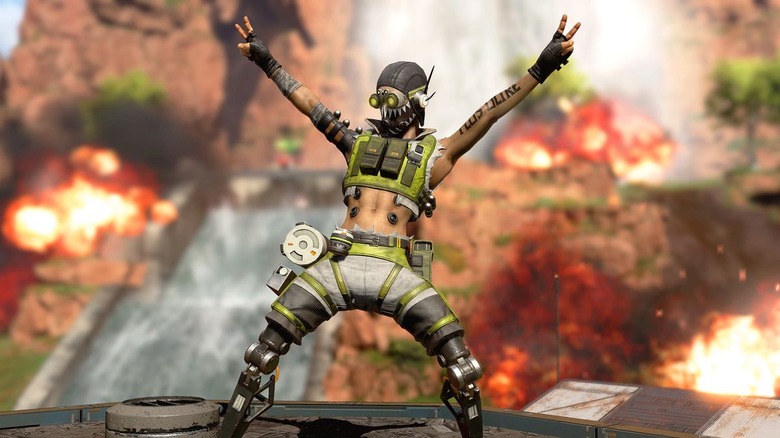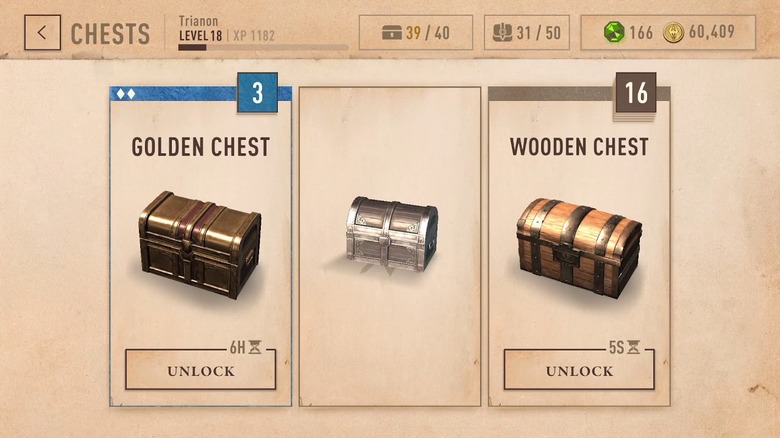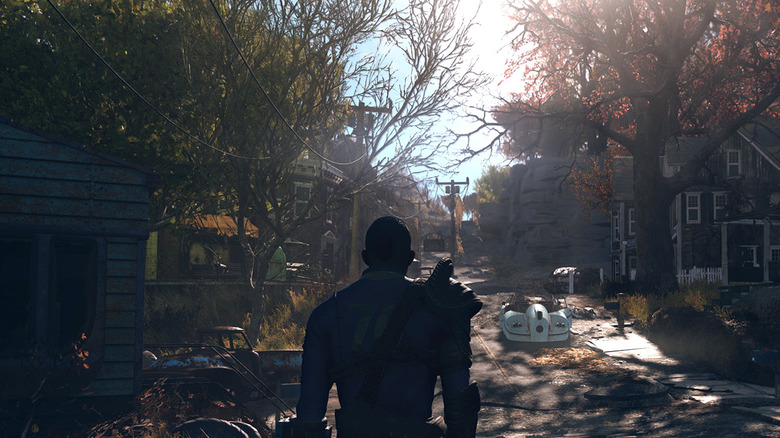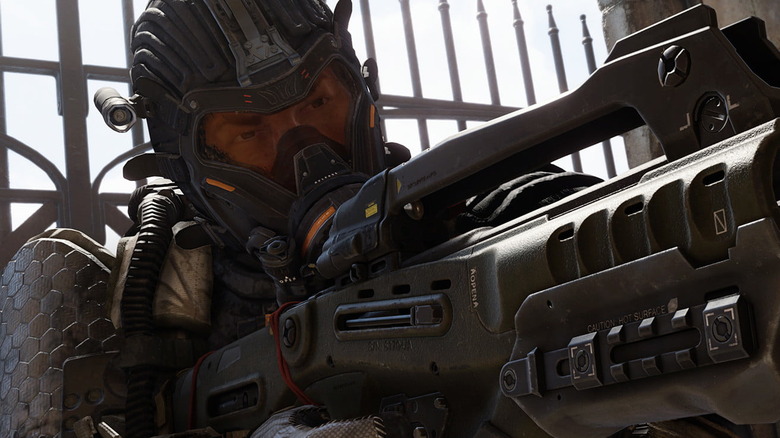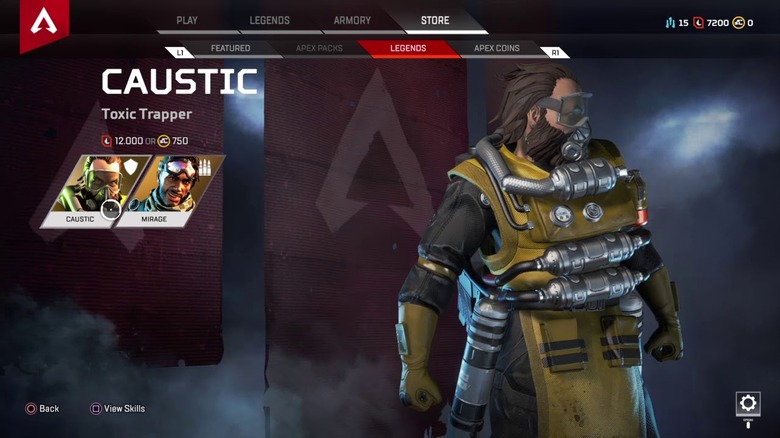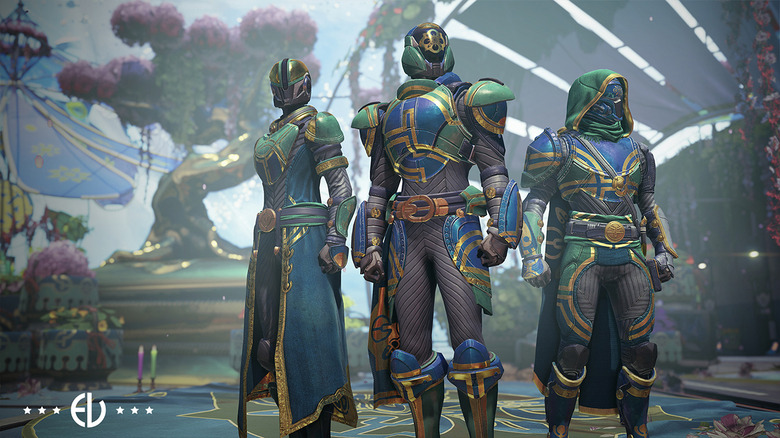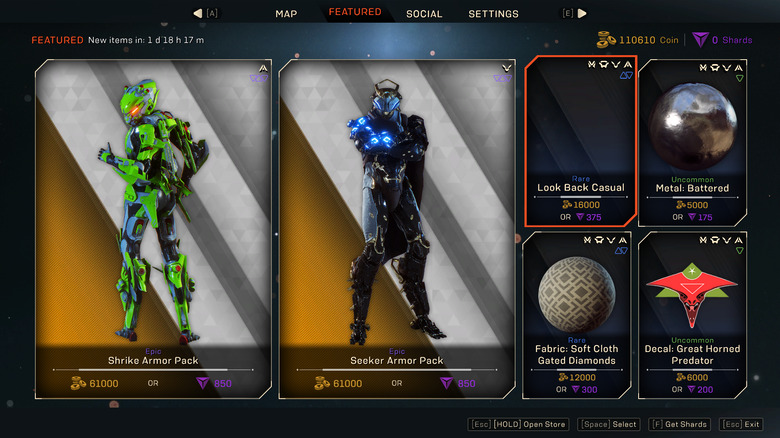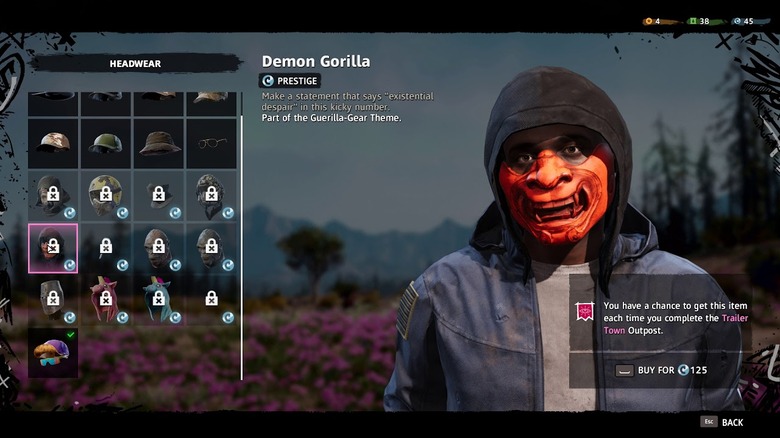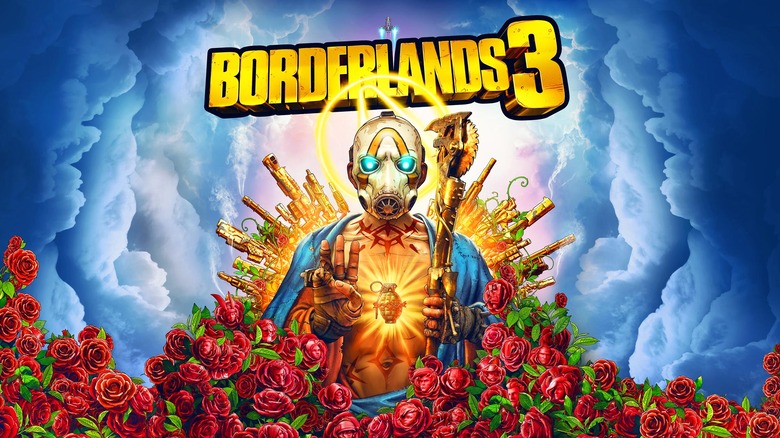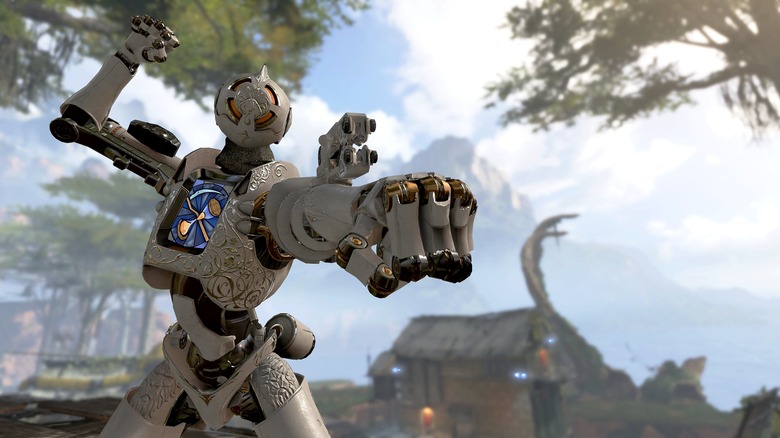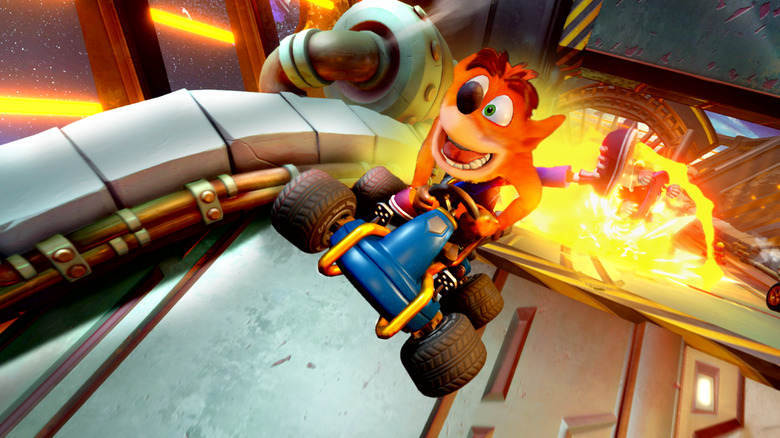The Worst Microtransactions Of 2019
Another year, another wave of games that are packed full of crappy microtransactions.
You have no idea how happy we'd be if we didn't have to write articles like these. How much it would warm our hearts if the games industry did away with loot boxes, and gem packs, and everything else that makes a game less fun to play out of the gate. We used to get lost in our games; they used to be worlds that allowed us to leave the real one behind for a few hours. We could pull some leather from a chest, fashion ourselves a sturdy pair of boots, and scale the highest peak, staring down at a land full of mystery and wonder.
Now those chests won't open right away without us pulling out our credit cards. Now that leather is harder to find, but the game will gladly sell you some. Now those boots aren't special, because anyone can get them; they just have to open enough loot boxes.
To avoid microtransactions entirely is to basically stop playing video games, as they're pretty much everywhere these days. But there are a few games that really go above and beyond to make their microtransactions worse than the rest. Below, we're going to tell you about all of the ones we've come across in 2019.
Here are the worst microtransactions of 2019.
Paying to open chests in The Elder Scrolls: Blades
The Elder Scrolls series is renowned for the exploration it allows. Is there a golden path story in most circumstances? Sure. But the games largely let you take off in any direction you choose, inviting you to climb large mountains, descend into dungeons, and of course, gather all the loot you can along the way.
That loot is arguably what makes an Elder Scrolls game work. It's the carrot on the end of the stick, promising you a reward for locating and opening a chest full of items. But in The Elder Scrolls: Blades, it's just something the game really wants you to pay for.
Many quests in The Elder Scrolls: Blades provide Silver or Gold-tier chests. These chests take multiple hours to open, and you can only open one at a time; that is, unless you pay for the gems required to do so. The game very clearly steers you in the direction of paying by making some missions too difficult to complete at a lower level, yet time-gating the chests that might have higher-level gear in them. And so you face the choice of either waiting a long, long time to open all of your chests — which may or may not have what you need — or giving in and paying money to immediately see what's inside.
It's gross, and it does the Elder Scrolls franchise a serious injustice.
Pay-to-win item repair kits in Fallout 76
We're pretty used to seeing pay-to-win schemes in mobile games; it's a wall that's unfortunately been breached, thanks to games like Clash Royale and its ilk. But most major developers have tried to avoid adding pay-to-win items in AAA games. After all, players are already paying upwards of $60 for access — why rock the boat by being even more greedy?
Enter Bethesda, the developer of the Elder Scrolls: Blades title we covered above. The studio managed to leave a stain on one of its most cherished franchises, giving Elder Scrolls fans the first game they had a reason to hate. And this year, Bethesda's done the same with the Fallout series.
Fallout 76 was supposed to be the Fallout that brought players together. It was a live-service, shared-world game making use of an incredibly popular license, and it could've been something great had Bethesda done right by it. But the game launched buggy. There wasn't enough content to keep people occupied. And the microtransactions? Atrocious. Early in 2019, Bethesda brought Repair Kits to Fallout 76, and they're exactly what they sound like: items that repair worn down or damaged equipment. These Repair Kits are sold in the Atomic Shop, and while players can grind for resources to purchase said Repair Kits, they can also spend real money to acquire them. And therein lies the issue.
These Repair Kits are pay to win, no bones about it. And they're yet another mistake Bethesda's made with microtransactions this year.
Weapons and XP boosts in Call of Duty: Black Ops 4
Remember the good old days of Call of Duty? Players could jump into multiplayer matchmaking knowing that everyone had access to the same guns. When you won a gunfight, it was because you outplayed your opponent. And when you lost, it was because your opponent outplayed you. Loot boxes weren't a factor. A random number generator didn't control your destiny. The world was fair.
Fast forward to Call of Duty: Black Ops 4, and that world is long gone. In its place is a land where money talks, and the more money you have, the more chances you have to get lucky.
The loot boxes added to Black Ops 4 in 2019 not only include cosmetics, but also hand out weapons to those who are fortunate to get them. On top of that, these loot boxes can contain weapons that also grant 25% more XP, which makes leveling up in the game faster. Forbes does a great job pointing out the absurdity of this, noting that Call of Duty: Black Ops 4 already costs $60 on its own, and asks players to pay an additional $50 for a season pass. Yet the game is still hitting people up to buy $2 loot boxes, and it's offering gameplay-changing advantages to those who do so.
No thanks.
Characters as microtransactions and expensive currency packs in Apex Legends
Look, we get it: Apex Legends is a free-to-play game. We understand that Respawn Entertainment and EA need some way to drive revenue, and with that in mind, we're totally fine having character skins, weapon skins, voice lines, and badges being available for purchase. These are purely cosmetic things, and they have no bearing on whether or not your Caustic can kill my Caustic more quickly in battle.
If I'm not even able to use Caustic, however, that's a major problem.
For all of the fun gameplay and all of the polish found in Apex Legends, its decision to lock characters behind a paywall is entirely unacceptable. These aren't characters that otherwise function the same aside from their looks; they have unique abilities and ultimates, and it's just a given based on how every hero-based shooter has operated in the past that, at some point, one of these characters will be more effective than the others. By keeping this system intact, Apex Legends is just begging for the pay-to-win sirens to go off.
On top of that, the way the game charges for cosmetics really needs work. Players have to use real-world funds to buy a special in-game currency, and that currency often costs more than the item you want. The result: you have currency left over, trapped in the game. Why can't studios just sell $10 of currency for a $10 skin?
These are disappointing aspects of an otherwise great game. It's a shame they have to be there.
Armor sets in Destiny 2's Eververse engrams
Destiny 2 is the ultimate looter shooter. You play activities in the game in order to obtain better armor or better weapons, and you're constantly on the search for the best rolls and the right mods to augment them. And Destiny 2, for the most part, rewards you for playing, and grants you a shot at top-tier gear if you take on some of the game's more difficult challenges.
The Eververse store, unfortunately, takes a wrecking ball to Destiny 2's philosophy of rewarding players for playtime. Because that store sells engrams for real money, and those engrams can contain armor pieces.
Defenders might say, "That's totally fine, because those armor pieces only drop at a Power Level of 10!" The problem with that argument is that the Power Level is something any player in Destiny 2 can change via infusion. What can't change, however, are the perks you receive with that armor. In all other parts of Destiny 2, you have to play the game and hope for an armor drop that has what you need. Thanks to the Eververse store, though, you can keep buying engrams, rolling the dice until the random number gods bless you with that perfect roll.
We have no beef with pretty much anything else the Eververse store sells. But the armor pieces are a bridge too far. They need to go.
The uselessness of the shops in Anthem
Anthem is a game published by EA; therefore, we knew it was going to have microtransactions. It was a given. And hey, we took part in Anthem's early betas, and saw what the folks at BioWare had planned in terms of cosmetics. They actually weren't that bad. In fact, the more we thought about it, the more we could see ourselves potentially shopping around in Anthem's store to try and make our Javelins look as cool as possible.
And then Anthem launched. It was a mess. BioWare wasn't ready for the backlash. And the in-game stores weren't ready to sell much of anything at all.
Rather hilariously, Kotaku found an instance where two vendors in Anthem's Fort Tarsis were mere steps from one another, yet were selling the same items. The number of wares each vendor had to offer? Six. Each vendor had six total items on sale, and they both had the same exact inventory. We didn't think we'd be adding a game to this list based on how awful its stores were, and how players actually wanted to spend money but couldn't, yet here we are.
Anthem's failed in many ways thus far. Not being able to take money from players who are ready to part with it? That really takes the cake.
Ubisoft managing to cram microtransactions into Far Cry: New Dawn
When Far Cry 5 released in March 2018, it came chock full of microtransactions, which is pretty par for the course in an Ubisoft title. The company does well to avoid pay-to-win in its games, though, so most see Ubisoft's take as relatively harmless. Are they present? Sure. Do you ever feel like you need them to play and beat the game? Not at all. Based on that, we gave Far Cry 5 a pass. It was a premium $60 title that took years to develop, and it was a wholly original work. Whatever; let them try to sell their trinkets.
Far Cry: New Dawn, however, does not get that same pass.
New Dawn released less than a year after Far Cry 5, dropping in February 2019. And honestly, we thought it kind of novel that Ubisoft was using an altered version of Far Cry 5's map to tell a tale from someone else's perspective. What we did not expect, however, was that Ubisoft would take what is essentially a standalone DLC and shove even worse microtransactions into it. According to Stuff, "Much of New Dawn's progression and perks are tied into crafting." The issue? The game promotes the heck out of the fact that you can purchase crafting materials with real money, skipping your way to new abilities, weapons, and animal partners.
Ubisoft dove straight into pay-to-win with Far Cry: New Dawn, and it sucks.
Borderlands 3 and microtransactions that somehow aren't microtransactions
We're sick to death of all the drama surrounding Borderlands 3; unfortunately, we couldn't make a list like this one without including it. If we're going to a shine a light on all the worst ways microtransactions are being used by developers and publishers, we have to call out every instance. And that especially means correcting the record on what is and is not a microtransaction.
Randy Pitchford, the CEO of Gearbox Software, made a bold claim about Borderlands 3 at a gameplay reveal event in April 2019, stating the game "won't have microtransactions." As you've probably guessed by now, it will (if you go by the definition pretty much everyone else on earth uses). Pitchford's statement was quickly refuted by Game Informer, which promptly got the magazine cussed out. And then Pitchford tried to qualify his statement by saying that Borderlands 3 wouldn't have loot boxes, just cosmetics that players could purchase.
Those small (micro) items that players can receive in exchange for a bit of money (transactions) ... those are not microtransactions? That's just being dishonest.
For the sake of this article, we won't get into the other storms that have been brewing around Borderlands 3 since. Just know that the game will, indeed, have cosmetic loot players can purchase. And yes, those count as microtransactions, regardless of what the guy in charge of Borderlands 3 has to say about it.
Apex Legends, again, 'missed the mark' with microtransactions
Which game has the unfortunate honor of being on this list twice? Why, it's Apex Legends, the free-to-play battle royale shooter that can't seem to find a happy place when it comes to the cosmetic loot it wants to sell.
The most recent dust-up occurred during the game's Iron Crown Collection event, which brought a Solos mode to Apex Legends for the first time and also added some of the coolest Apex skins ever created. The problem, unfortunately, was that the vast majority of the event's cosmetics were locked behind paid loot boxes. And even then, players weren't guaranteed to get the skins they wanted.
But that's not the worst of it. A fantastic heirloom item called the Raven's Bite axe was made available for 3,500 Apex Coins, and was only available to those who'd collected every other cosmetic during the Iron Crown Collection event. That meant players had to spend at least $170 on loot boxes in order to obtain the axe, and due to the random nature of loot boxes, it's likely they would've spent far more.
Luckily, developer Respawn Entertainment shifted course a few days into the event and pledged to offer Iron Crown Collection skins for purchase directly in the store. Still not the best solution, but a better one.
The Crash Team Racing remaster solved a problem in the worst way possible
Here's a general rule of thumb when it comes to Activision and its microtransactions: nothing is sacred. Remember Call of Duty: WWII and loot boxes dropping onto the hallowed beaches of Normandy? If Activision isn't the least bit concerned about desecrating a site where thousands of US soldiers perished, then it certainly isn't going to care what you think about microtransactions in a remastered kart racer.
That said, we definitely understand why fans are upset about the way paid loot has been handled in Crash Team Racing Nitro-Fueled.
It all centers around the way players unlock new characters and items in the game. Believe it or not, the Crash Team Racing remaster launched without any microtransactions at all. Unlocks came by way of an in-game currency, which players had to grind for by replaying levels and completing challenges. But some felt that grind was way too difficult, and it wasn't long before players asked for changes to the in-game economy.
Activision's answer? Microtransactions! If you're tired of grinding for those characters you want, just buy them!
To say this isn't what fans wanted would be an understatement, never mind the fact that Activision gave no indication at all that paid loot would come to Crash Team Racing Nitro-Fueled. The company benefited from the stellar reviews of CTR, and then shoved microtransactions into the game after the fact. Not cool.

